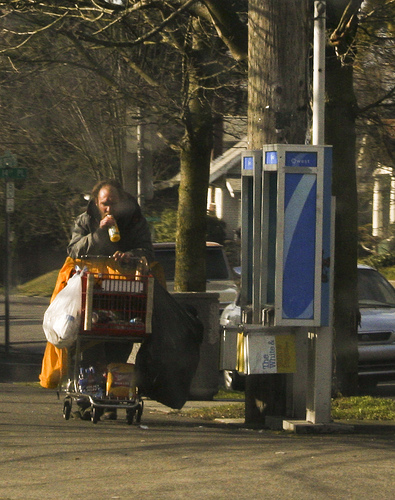Homeless Resource Hotline Wins $500 Twilio Credit [Developer Contest]
Time to read:


As Mahmood explains:
“Currently, finding which soup kitchens are open today or where there may be beds is a daunting task. There are many organizations that offer free meals, but you often need to call the organization to find out where and when they will be offering meals. The hotline provides all the information within seconds!” photo credit: Zervas
How the Homeless Resource Hotline Works
Since the hotline is a toll-free number and any person can access the listings through a public pay phone for free. Simply dial 877-231-6067 to try it out for yourself.
On their weekly homeless outreach, Ecclesia Ministries can distribute business cards with the number and a small map of the various organizations.
The application reads the listings off public Google calendars, currently containing information for downtown Boston. Using the popular Google calendar as a datasource eases the adoption of the product because the organizations neither need to learn nor maintain yet another calendar.
What $500 in Twilio Credit Means for Homeless Hotline
1. Expand the service to other cities, namely New York City and San Francisco. Adding new cities to the service only involves pointing the app to the appropriate calendar sources.
2. Encourage the homeless organizations to maintain their own online calendars. We have populated the calendar ourselves by contacting the various agencies. For the system to be scalable though, the organizations need to take that responsibility.
Interview with the Developer: Mahmood on Building the Hotline
How did you hear about Twilio?
I first heard about Twilio through the Google App Engine Blog,
announcing the Twilio + App Engine contest. I was amazed by the previous
winning projects, especially the Mobile Commons hotline. Yet, this is
our first time participating in a Twilio contest; actually this is our
first Twilio app!
Can you please tell us about the non-profit you chose to support?
We didn’t choose to support a particular non-profit organization, but
rather a group of non-profit organizations that are all committed to
reducing hunger and homelessness in our local Boston community. Boston
has many organizations that care for the homeless (e.g. Ecclesia
Ministries, St Anthony’s Shrine, St. Francis House, Rosie’s
place), and organize many volunteering opportunities. Our church
participated in one of the activities, Bread on the Common, where
volunteers and the organizations feed the homeless and connect them
with various establishments.
One of the challenges faced by organizers, volunteers, and the new
homeless alike has been finding up-to-date information about available
resources. Each shelter has a different sign up time, and each
organization provides meals at different times. The hotline
particularly addresses this problem. It provides up-to-date relevant
information to the homeless and the volunteers alike.
What are your plans for the Homeless Resource Hotline now that you have $500 in Twilio credit?
We are planning to spread-the-word to volunteers, and other local
organizations, as well as the Mayor’s hot-line so it can be the main
resource for the homeless and volunteers to find up-to-the-minute info
and details. We hope that the credit will sustain the project for at
least another year or two. We are also planning to reach out to the
homeless organizations in New York City and San Francisco to expand the
hot-line services there as well.
Homeless organizations (or local regional non-profits) can reach me at nonprofit@primitivetypes.com. We want to bring the service to as many cities as possible.
What technologies did you use to build the hotline?
We built the hotline app using Twilio, Google App Engine, and Google
Calendar. The application pulls a feed of a public Google Calendar
feed of the homeless events, and interfaces with the Twilio telephony
service. As we expand the service, we can just point the app to the
calendars of the new organizations; they don’t need to maintain yet
another calendar!
We also use Google Translate to provide the Spanish translations. We need to verify it with a Spanish speaker first though!
How long did it take to create?
Two days over the weekend only! It took me one day to learn the
technologies (this was my first GAE and Twilio app!), and implement the
basic functionality of the line. I spent the second day polishing it
and getting some user feedback. Populating the calendar with relevant
information was the most cumbersome part! My fiancee and I spent hours
looking for information and calling various agencies to get event
details.
Overall, the Twilio API is very simple, and the Python API makes it even simpler!
Related Posts
Related Resources
Twilio Docs
From APIs to SDKs to sample apps
API reference documentation, SDKs, helper libraries, quickstarts, and tutorials for your language and platform.
Resource Center
The latest ebooks, industry reports, and webinars
Learn from customer engagement experts to improve your own communication.
Ahoy
Twilio's developer community hub
Best practices, code samples, and inspiration to build communications and digital engagement experiences.


